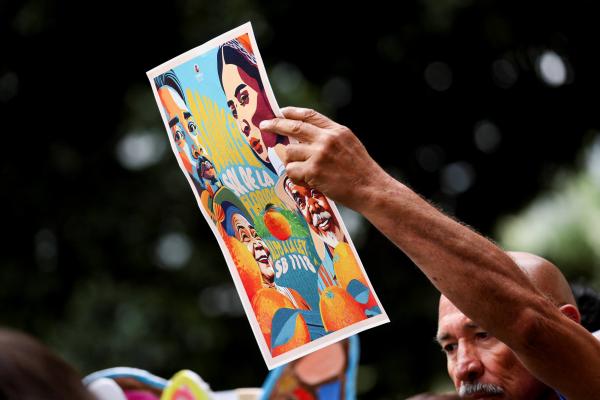During the presidential debate in September, then-Republican candidate and now President-elect Donald J. Trump propagated a Facebook rumor that Haitian immigrants in Ohio were stealing neighbors’ pets and eating them. While the rumor has since been debunked, anti-immigrant rhetoric like this makes it easier for lawmakers to drum up support for laws such as Florida’s SB 1718, a law that is meant to address illegal immigration.
When Florida’s Republican governor, Ron DeSantis, signed SB 1718 last year, he declared it “the strongest legislation against illegal immigration anywhere in the country.” When the bill was first proposed, it included some particularly cruel policies that would discourage immigrants from seeking access to basic services such as rides to church or medical care.
I live in Florida, and I know that there are Christians in my home state and around the country who celebrate laws like SB 1718, believing strict legislation around immigration makes our country safer. But other Christians grieve these kinds of proposals, knowing they have the potential to rip families apart, ruin lives, and further marginalize already struggling communities.
The Catholic nuns at Hope CommUnity Center in Apopka, Fla., know this grief all too well. They have dedicated their lives to fighting for justice on behalf of one of the largest populations of undocumented immigrants in the country.
With over 50 years of service, Sister Ann Kendrick has traveled to Washington, D.C., and Tallahassee, Fla., the state capital, to protest harmful laws and advocate for immigrants and migrant farmworkers. Alongside other nuns, she started a clinic, a credit union, a housing project, and a food co-op to serve the Apopka community. She’s facilitated service-learning experiences for hundreds of college and church groups. She’s supported children and families as they dealt with the trauma and aftermath of raids and deportations. The immigrants she’s known and loved over the years are “good, faithful, God-loving-and-fearing people,” she said, “who, in spite of terrible obstacles and terrible rejection and terrible attacks, continue to believe in goodness and kindness.”
I first met Sister Ann when my campus ministry took a group of students out to Apopka for a service-learning weekend. Migrant families welcomed us into their homes. In the mornings, we worked at a cabbage field, and in the afternoons, we heard lectures and took part in activities that educated us about the broken and often unjust U.S. immigration system. Sister Ann invited immigrants from the community to share their stories. She also told us her story.
As a teenager in Syracuse, N.Y., Sister Ann dreamed of living in Europe. She applied to a student exchange program hoping to be placed in Paris. Instead, she was placed in Guatemala.
Despite her initial disappointment with the placement, her life was changed. She fell in love with the culture and the people: their goodness, hospitality, and faith. She also witnessed broader society’s racist treatment of Indigenous groups. One particular event marked her forever: The eldest daughter of her host family was kidnapped and killed for her involvement in a movement resisting the corrupt Guatemalan government.
Sister Ann returned to the U.S. a radically different person. She began interrogating concepts of injustice, cruelty, and dominance. She attended a Catholic college and was exposed, for the first time, to Latin American liberation theologians such as Gustavo Gutiérrez. Some years later, she moved to Florida with the intention of staying for a year or two before returning to academia to teach liberation theology. Of course, she ended up staying much longer.
Hearing Sister Ann’s story and learning about the struggles of undocumented people living in the U.S. changed my life as well.
In 2017, less than a year after that service-learning trip, I moved to Apopka to work for Hope CommUnity Center through their AmeriCorps program. In that year, the Trump administration announced that it was ending the Deferred Action for Childhood Arrivals program. I witnessed the fear of hundreds of high school students in the community as their futures hung in the balance due to the possibility of being deported. The next year, in 2018, media outlets exploded with news of inhumane family separation practices at the border.
Although it’s been a few years since I left Hope CommUnity Center, I think about Apopka and the community there every time a new piece of legislation threatens the lives of immigrants.
When I first heard of SB 1718, I thought of how much more difficult things would be for undocumented people who already face a multitude of daily anxieties most U.S. citizens could never understand. Simple things like driving to work pose incredible risks for them, as a traffic stop could result in their deportation. All I could think about after SB 1718 was signed into law was how this legislation would only make a bad situation worse.
Sister Ann said that SB 1718 has stoked even greater feelings of fear among immigrants. Although she is a citizen, Sister Ann has also been impacted by the law on a relational level. She was liable to be arrested and jailed for up to 15 years for what the law considers “trafficking” of adults or children. In reality she was simply providing rides for undocumented people, as she has done for the past 50 years.
The law could also have negative effects on Florida’s economy. Citizens of the U.S. are not filling job gaps left by immigrants, according to farmers in Plant City, Fla. More often than not, anti-immigrant policies hurt us in more ways than one, crippling our economy and destabilizing relationships.
When Christians embrace anti-immigrant rhetoric, we ignore a key demand of the gospel: We must reject the principles of Babylon — greed, domination, and oppression — and embrace the more difficult work of compassion and justice modeled by Christ.
Sister Ann takes this part of the gospel very seriously.
When I think of Sister Ann’s work, I think of the Peruvian theologian who shaped both of our understandings of faith and justice. In a 2011 interview with the National Catholic Reporter, Gustavo Gutiérrez said, “A spirituality of liberation will center on a conversion to the neighbor, the oppressed person, the exploited social class, the despised ethnic group, the dominated country. Our conversion to the Lord implies this conversion to the neighbor.”
If we want to practice this conversion to our neighbor, if we want to live out the gospel, then we must first start by listening. Sister Ann hears children with undocumented parents “talk about going to school and being afraid that when they come home, maybe their parents aren’t there because there was a raid at their house.”
Considering what we know about Trump’s anti-immigrant agenda, I hope more Christians can unite in their efforts to care for those the Bible refers to as the stranger, the foreigner, or the alien. We must reject the myths and rumors designed to make an enemy out of the marginalized and instead see them as our neighbors.
Got something to say about what you're reading? We value your feedback!







